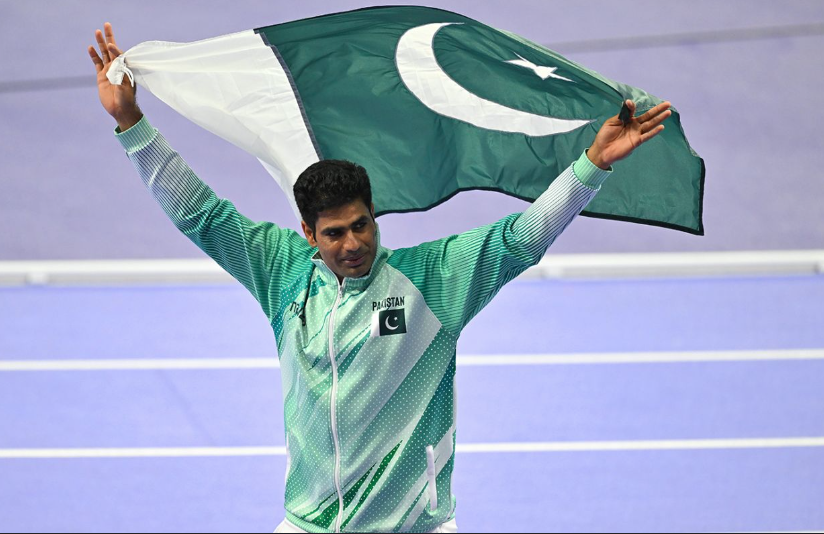
On August 8, 2024, Arshad Nadeem made history by winning Pakistan’s first-ever individual Olympic gold medal in athletics with a record-breaking javelin throw. This extraordinary achievement has captivated viewers and demonstrated the incredible potential that can be unlocked with determination and proper support. However, it also raises a crucial question: How can Pakistan build on this success to ensure it is not a one-time occurrence? The answer lies in implementing government-backed athletic training programs that could transform Pakistan into a dominant force in athletics and other individual sports.
Arshad Nadeem’s gold medal is a source of immense national pride and highlights the significant gaps in Pakistan’s sports infrastructure. Historically, Pakistan’s presence in global athletics has been minimal, with the country primarily recognized for cricket and field hockey. Despite a population of over 240 million, Pakistan had previously won only ten Olympic medals, all in team sports, with the last individual medal being a bronze in wrestling (1948) and boxing (1988). The last Olympic medal before Arshad’s gold was a hockey bronze in 1992, and the last gold was in 1984. This long-standing record underscores the urgent need for a structured approach to developing talent in sports beyond cricket and hockey.
Arshad Nadeem’s path to Olympic glory is truly inspiring. Hailing from Mian Channu, a small town in Punjab, Arshad’s ascent to the top of world athletics was driven by sheer determination and an unwavering work ethic. He started with minimal resources, training with outdated equipment and receiving limited coaching. Despite these challenges, his natural talent and persistence shone through. His early successes in regional competitions quickly earned him recognition and made him a symbol of hope for Pakistan’s athletics community.
In the years leading up to the 2024 Olympics, Arshad faced numerous obstacles, including injuries and limited access to advanced training facilities. Nevertheless, his relentless dedication led to continual improvement, setting new records and winning medals in international events. His victory in Paris not only marked him as Pakistan’s first Olympic gold medalist in athletics but also brought immense pride to a nation that had been without an Olympic medal for over two decades.
Arshad Nadeem’s gold medal signifies a pivotal moment for Pakistan’s sports landscape. It has sparked national pride and inspired many young athletes across the country. However, it also highlights the critical need for substantial reforms in Pakistan’s sports infrastructure and athletic training programs.
Currently, Pakistan’s athletic training programs face significant challenges, including limited funding, outdated resources, and insufficient modern facilities. Most athletes, like Arshad Nadeem, train under subpar conditions, with inadequate equipment and minimal access to quality coaching. The few existing facilities are mainly located in urban areas, leaving rural athletes with limited opportunities to develop their skills. The lack of a structured talent identification program further exacerbates the issue, as many talented individuals remain undiscovered and unsupported.
In contrast, countries with high Olympic medals counts invest heavily in sports development. China’s “National Team Training Program,” for example, plays a crucial role in the country’s Olympic success by identifying and nurturing athletes from a young age and providing them with access to top-notch facilities, coaching, and medical support. In 2020, China allocated $1.4 billion to sports development, reflecting a strong commitment to athletic excellence.
Similarly, the United States “Olympic Development Program” (ODP) is essential for scouting and developing young talent across various sports, offering top-tier coaching, nutrition, and sports science support. In 2020, the USA invested $2.5 billion in sports programs and talent development.
Japan’s “Sports Development Program” focuses on early talent identification and intensive training, supported by substantial government funding and collaborations with international experts. This program enhances athlete performance through specialized sports academies and training centers.
To replicate these successes and produce more Olympic champions like Arshad Nadeem, Pakistan must adopt similar strategies and significantly increase investment in sports infrastructure and training programs. The government should establish a National Sports Development Fund to build modern training facilities, particularly in rural areas, and create a nationwide talent identification program modelled after China’s approach.
Additionally, Pakistan needs to invest in developing coaches and sports scientists to provide athletes with the best guidance possible. Partnerships with international sports organizations and experts will bring advanced training techniques and technologies to Pakistan. Expanding funding for sports programs across various disciplines—not just cricket—will ensure that all athletes have the opportunity to excel.
Arshad Nadeem’s historic Olympic gold medal win is a moment of immense pride for Pakistan but should also act as a wake-up call. The government must recognize the untapped potential within the nation’s youth and take immediate action to nurture this talent for the future.
